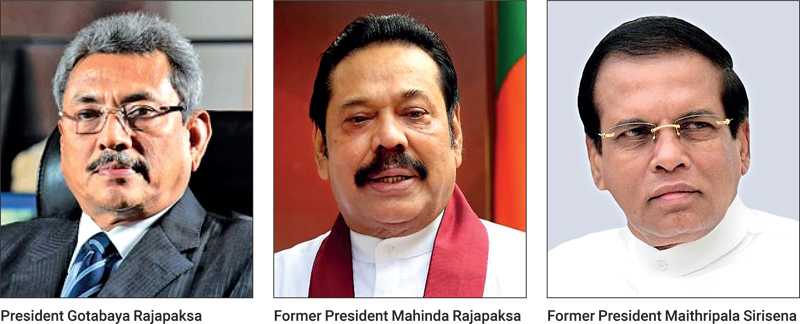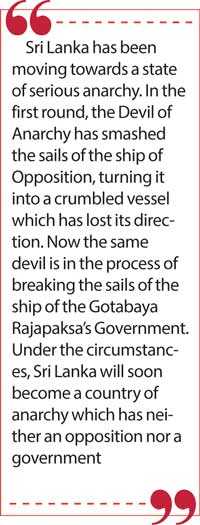Monday Feb 16, 2026
Monday Feb 16, 2026
Friday, 23 October 2020 00:00 - - {{hitsCtrl.values.hits}}

 The Government of Gotabaya Rajapaksa can be seen as a logical outcome of the Yahapalana opportunism that preceded it.
The Government of Gotabaya Rajapaksa can be seen as a logical outcome of the Yahapalana opportunism that preceded it.
In the immediate aftermath of the ending of the internal civil war, there was a strong need to introduce structural reforms to save the State from extreme decline and distortion it had plunged into. But, the Rajapaksa regime failed to fulfill this need, and it ultimately resulted in the defeat of their regime in 2015.
The Yahapalana Government which came to power as a by-product of this did not play the reformist role that the history expected of it. What came out of it was only a bluff and deception. It narrowed down the reformist agenda by corrupting the essence of it, selfishly and opportunistically.
Narrowing the agenda
It followed a policy which avoided the need for resolving the national crisis, the fundamental issue that had plagued the country, stating that it was not a matter of urgency at that moment.
Also, in reforming the political system, it attached greater importance to reforms which had a populist flavour while completely ignoring the need for abolishing the corrupt system of plundering the public property by ruling parties which can be considered the main systemic problem.
The plunder of public property over a long period was the net result of the government having exceedingly autonomous powers capped by legal immunity and the discretionary power of the President to sell, lease, or grant them as gifts within an unlimited framework, and the power of immunity enjoyed by him. The MPs were engaged in business transactions with the government unlawfully and openly.
Despite the damage caused to the political system by these two factors alone being immense, the 19th Amendment has done nothing to change the ugly situation created by them.
Black money
The dependence of political leaders and political parties on the dealers of black money can be reckoned as another powerful factor leading to corrupt the political system of Sri Lanka.The cost incurred by a leading presidential candidate is around Rs. 3 billion. By common knowledge the two main candidates seem to secure a major portion of this cost from drug dealers.
In almost every country where democracy is operational there are strict laws to surveil and control election expenditure. Even in Sri Lanka such laws were in operation until 1977.In almost every country which has a system of well-secured Elections Commission, the commission is empowered to pass the laws required for surveilling and controlling the funds of political parties and those of electioneering, as well as investigating into the internal administration of political parties and ensure that they are conducted in conformity with accepted democratic principles.
But the Election Commission of Sri Lanka has been created in such a way that it has no effective control over these two issues. It is not just an error of ignorance or negligence or an oversight. It appears to be a calculated move backed by shrewd intentions to let go the corrupt system under the cover of superficial democratic embellishments.
Election Commission
These defects inherent in the Election Commission cannot be considered as issues discussed only before the 19th Amendment. They had been adequately discussed previously, along with the enactment of the 17th Amendment to the Constitution. Produced below is a public comment I have made on this issue as far back as 2009.
“According to the Commissioner of Elections, no one who has drafted the 17th Amendment has discussed it with him. It clearly reflects the limitations inherent in those who drafted the 17th Amendment. The authors of this constitutional amendment may have done it with good intentions and sincere feelings. But the work has been done in a hurry, without making an in-depth study in drafting it , even the Commissioner of Elections has not been consulted and his views obtained.Not only that. At least, the Election Commission of neighboring India has not been taken into consideration.” – 17th Amendment and the Election Commission, Ravaya, 19 April 2009.
The following is another excerpt from the same article: “Another significant fault of the 17th Amendment is that those who have drafted it have done it without having a proper understanding of the prevailing political system of the country.The 17th Amendment to the Constitution has been drafted without giving due consideration for the manner in which the presidential system is structured. An attempt to tether a cow becomes invariably futile when the rope used for it cannot withstand its strength. The Judiciary gave its approval for the 17th Amendment not because it was in conformity with the Constitution, but because it felt the need for approving it as there was no other measure for the Government to overcome the crisis it was facing at that time. President Kumaratunga knew right from the beginning that the proposed constitutional amendment was not in conformity with the Constitution, and therefore it was likely be rejected. Similarly, those who were dreaming for becoming presidents also were well aware of it. In the final analysis, it was the people, not the rulers, who were deceived.”
Independent commissions system
Appointment of people, without political influence to positions in a country where the institutional system is afflicted with rampant corruption and inefficiency will not make them corruption free or efficient. The country’s judicial system was in a state of rapid decline. It is important to ensure that there is no political influence in the appointment of judges. But the fulfillment of this condition alone will not bequeath the country an independent and wholesome Judiciary. But those who introduced the system of independent commissions, as well as those who advocated it, not only believed that a system of appointing judges without political influence would lead to an independent judiciary, but also bragged about it publicly.
The cost of maintaining the system of independent commissions is enormous.Many commissions have been assigned with a minor role not commensurating with the cost of maintaining them. Perhaps, the effect of this system would have been more productive if the Constitutional Council and the independent commissions had taken upon themselves the responsibility of appointing the heads of institutions and thereafter monitoring their performance to ensure that they discharge the responsibility assigned to them properly and upto desired standards and expectations.
The Yahapalana theoriticians had given a new interpretation to the corruption by the rulers of previous regimes. According to them the rulers of previous regimes except those of the Rajapaksa era were not corrupt. This narrow and selfish precept adopted in investigating corruption of previous regimes led to make the entire program a chaotic jumble.
Mess of a change
Just as there were irregularities in the way things were done to establish a system of good governance by defeating the Rajapaksa regime, there was also an element of conspiracy throughout the process adopted for it. Usually in a democratic system, it is the main opposition that forms the next government following the defeat of the Government in office. The leader of that party will be the next head of State.
But in 2015, an unusual method that prevented the usual flow of transition was implemented. A program was launched to socialise the idea that Ranil cannot defeat Mahinda and as such a common candidate is needed to defeat the Rajapaksa regime; this ideology was promoted under the image of Ven. Maduluwawe Sobitha Thero. Although there were a certain number of groups of different walks of life that had come together to support this movement the people who subtly handled it constituted a group that had once worked with Ranil closely and hated him later for various reasons.
The strategic objective of their program was to make the common candidate to contest the presidential election with the approval and the support of the UNP, create a situation in which Ranil could not contest and gain power, to seize the maximum power of the new government expected to be formed, and to remove Ranil from the UNP leadership, and have a new leader whom they could manipulate appointed in his place.
Ranil was well aware that a trap had been set against him. However, in view of the disorder and confusion that prevailed in the party, Ranil adopted a counter strategy of extending his best support to the common candidate and ensure his victory.
The ironic ending
But the common candidate who was elected the president was not a puppet that Ranil could have made to dance to his tune. The President, soon after his election, forgot that he had come to power with the support and strength of the UNP. Ranil believed that President Chandrika would do more for him than his rival group could do with the President. Chandrika had also received an assurance from Ranil to that effect.
Though his rival group was not successful in preventing Ranil from becoming the Prime Minister, they however, managed to turn the suspicion between the two leaders into a bitter hatred. This eventually resulted in turning the path of the Yahapalana regime into a ridiculous farce.
Long before the formation of the 52-day Government, a lot of unpleasant things had begun to happen behind the scene. It was they who made the relationship between the President and Gotabaya a very close one. It was they who prepared the basic background which led Shani Abeysekera to the guillotine. Not only the class but also the caste that the President belonged to, have contributed to create the bitter animosity between the President and the Prime Minister.
Maithripala Sirisena did not fit into the presidency compared to all the others who have held it. Maithripala did not possess the potential to win the presidency on his own except by a political conspiracy. In that sense, it is not difficult to understand his shortcomings and mistakes committed by him. Perhaps, this group that had taken the lead in making the Yahapalana regime, a theatrical mockery may have had good reasons to have a deep hatred with Ranil Wickremesinghe. But their hostile actions did not stop at destroying Ranil and the UNP only. So much so, it has done a great damage to the people and the country in general.
I am not saying that the Yahapalana regime could have proceeded on the right way if it were not for them. But the devastation caused would not have been so huge if it was not for them.
In any case, historically, Sri Lanka has been moving towards a state of serious anarchy. In the first round, the Devil of Anarchy has smashed the sails of the ship of Opposition, turning it into a crumbled vessel which has lost its direction. Now the same devil is in the process of breaking the sails of the ship of the Gotabaya Rajapaksa’s Government. Under the circumstances, Sri Lanka will soon become a country of anarchy which has neither an opposition nor a government.